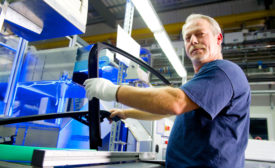Automotive Assembly
Assembly Automation
Process Planning Is Critical to Success of Assembly Automation Projects
March 1, 2001
Never miss the latest news and trends driving the manufacturing industry
Stay in the know on the latest assembly trends.
JOIN TODAY!Copyright ©2025. All Rights Reserved BNP Media.
Design, CMS, Hosting & Web Development :: ePublishing




